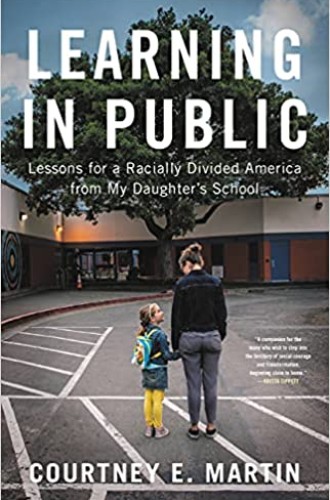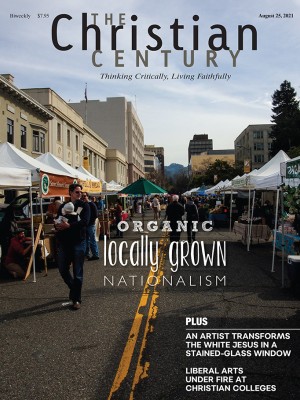Addressing educational inequity means loving other people’s children
Courtney Martin invites progressive parents to reckon with racial justice.
Last year, soon after George Floyd’s murder, women in my almost all-White Anglican church in the Chicago suburbs read James Cone’s The Cross and the Lynching Tree. I was one of two Asian American women in the group. When we started asking what it really means to act as if Black lives matter as much as White lives, the conversation got real. Someone suggested diverting resources from our suburban schools to struggling city schools. In the thick silences, we reckoned with the reality that racial justice might mean our kids don’t always get the best.
This reckoning is the premise of Courtney Martin’s new book. Martin is a journalist who moved from Brooklyn, New York, to Oakland, California, when she was pregnant with her first child, who is now a second-grader. Oakland Unified School District’s open enrollment policy allows families to apply to attend schools outside of their neighborhood, effectively creating a system where the most informed and advantaged parents can opt out of failing neighborhood schools and concentrate their resources in the better-ranked schools.
Read our latest issue or browse back issues.
When her daughter approached school age, Martin anguished over the enrollment decision, along with many of Oakland’s White and economically advantaged parents (and she includes Asian American parents in this category). It boils down to an apparent trade-off between the (usually) White mom’s progressive politics—which would entail sending her child to the neighborhood school—and her responsibility as a parent, “which would necessitate using her privilege to get her kid into the ‘best’ school she can possibly access,” Martin writes.
Martin believes that one solution to educational inequity in the United States, albeit not the only solution, is voluntary integration by White families into predominantly Black and Brown schools, which are frequently under-resourced and poorly ranked in test scores and other measurable outcomes. This book is a narrative of the conversations and experiences she and her family have as they join the local school community and learn what it means to “show up, shush up, and stay put,” as the founder of the organization Integrated Schools puts it. (Martin has started a local chapter in Oakland.)
A skilled journalist, Martin also includes plenty to complicate this narrative. There’s the Black father who uses his own privilege to get his kids into a better-performing school and tells Martin, “Our highest ethical duty is always to our own kids.” This sounds different coming from the mouth of a Black parent in the context of historic racism. There’s Martin’s daughter’s Black teacher, who quits teaching at the public school to start her own Afrocentric preschool and homeschool her own children. And then, of course, there’s gentrification and the White savior complex. When do White families moving into poor neighborhoods and enrolling their kids in predominantly Black and Brown schools cross from integration to colonization?
Martin’s account will no doubt discomfit many White progressives, whom she portrays as worshiping at the altar of social justice but then making excuses when it comes to sacrificing any perceived educational benefits for their own children: “We just want a good fit. We just have this thing about dual-immersion education . . . we just know our kid needs to be in a classroom with lots of movement and project-based learning.” White Americans, Martin writes, imagine their individual choices in a vacuum (“I’m just doing what’s best for my child”), all the while acting as a bloc to systematically disinvest in public education, which exists to serve all children. She asks repeatedly, “Can we love one another’s children?”
Here, Martin admits that religious folks may have an advantage. As a professed agnostic, she envies those “whose faith is a steadying force in the midst of so much White fear.” Her neighbors, for example, live with Martin in a cohousing community, founded by a group of Christians but open to all people. The couple sent their son, now an adult, to the neighborhood school because they wanted to “get incarnational.” They tell Martin, “In order for God to interact with us in a meaningful way, He became a child, in a particular place, in a particular time.”
But in retrospect, both parents regret the decision. Their son was and is very sensitive to suffering, and they feel they asked too much of him. Martin remains unconvinced: “Too often, I’d guess, we don’t give our kids enough credit for what they’re capable of, or for their hunger for the truth of the world.”
I wonder these same things as I interact with my oldest child, who, like Martin’s daughter, finished kindergarten in a pandemic and attended most of first grade online. In our predominantly Latinx district, at a Title I school where all students get free meals and kids frequently stay home unsupervised while parents are out at work, how much do I raise the realities of poverty, undocumented immigration, climate change, racism, and toxic politics? Will I leave him, like this couple’s child, with a sense of “floating in an abyss” of suffering?
Maybe the real question is not, “How much do I expose my child?” Children will find out about suffering one way or the other. A better question may be, “Then what?” How will we equip our children to weather pain and dwell in what Parker Palmer calls the “tragic gap” between what is and what could be?
When we wake up to the profound injustices in our world, realizing our complicity in perpetuating them, we can keep doing what we’ve always done or we can change course. Martin writes in her final pages, “Stop looking away.” Christians are faced with an even more profound imperative: follow a God who sent his son into the depths of human suffering. No excuses can justify our failure to embody this kind of love.






